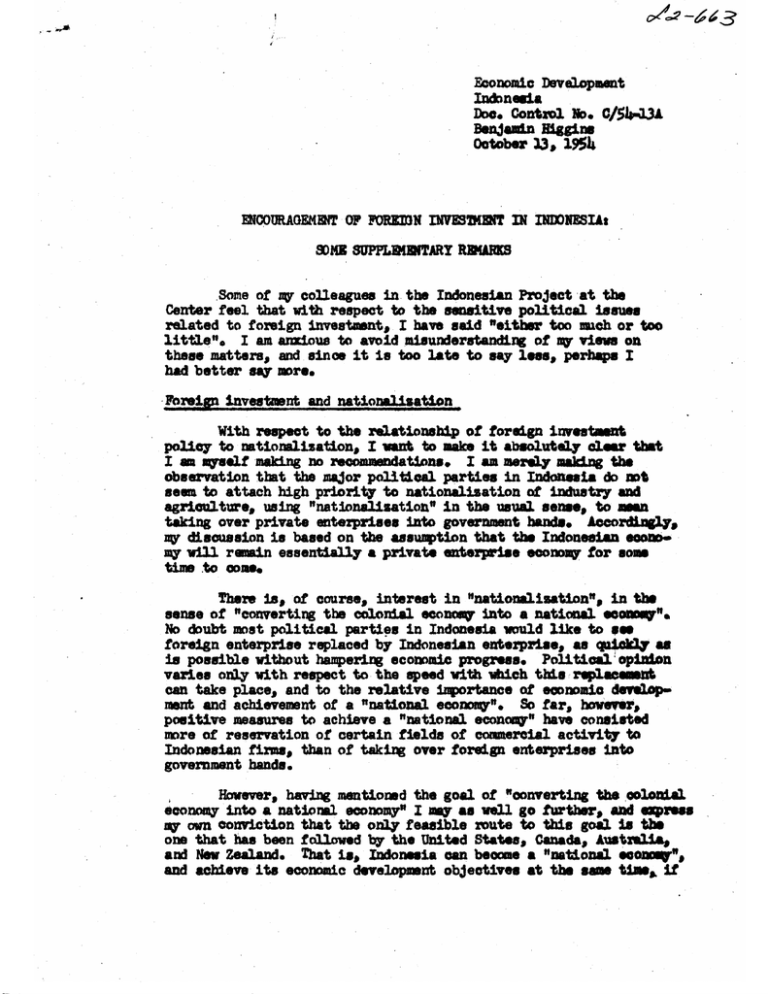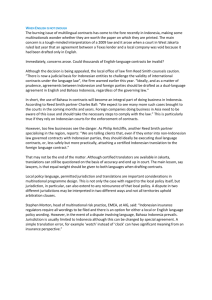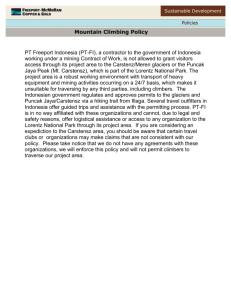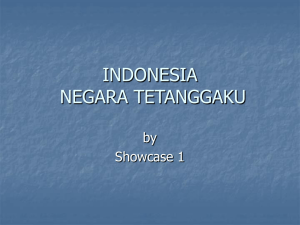3, Doc. ContrxI No. c/5i,3A otober 1954
advertisement

,lv -,'3 Economic Development Indonesia Doc. ContrxI No. c/5i,3A Benjamin Higgins otober 3, 1954 ECOTRAGEMET OF FOREMN INEMrKt4T IN INDONESIA: SOME SUPPLED TARY RNRKXS Some of my colleagues in the Indonesian Project at the Center feel that with respect to the sensitive political issues related to foreign investment, I have said "either too much or too little". I am anxious to avoid misunderstanding of my view. on these matters, and since it is too late to say less, perhaps I had better say more. Foreign investment and nationalisation With respect to the relationship of foreign investment policy to nationalisation, I matt to make it absolutely clear that I am myself making no recmentations. I am merely maidng the observation that the major political parties in Indonesia do not seem to attach high priority to nationalisation of industry and agriculture, using "nationalisation" in the usual sense, to mean taking over private enterprises into government hands. Accordbigyo my discussion is based on the assumption that the Indonesian econo. my will rmAin essentially a private enterprise economy for some time to come. There is, of course, interest in "nationalisation", in the sense of "converting the colonial economy into a national eomoy". No doubt most political parties in Indonesia would like to so foreign enterprise replaced by Indonesian enterprise, as quickly as is possible without hampering economic progress. Political opinion varies only with respect to the speed with which this repla,-ma can take place, and to the relative importance of economic development and achievement of a "national econom". So far, however, positive measures to achieve a "national economy" have consisted more of reservation of certain fields of comercial activity to Indonesian firms, than of taking over foreign enterprises into government hands. However, having mentioned the goal of "converting the olonil economy into a national economy" I may as well go further, and esress my own conviction that the only feasible route to this goal is the one that has been followed by the United States, Canada, Australia, and New Zealand. That is, Indonesia can become a "national econow", and achieve its economic development objectives at the same t4is, if policy is directed towards improving Indonesian agriculture, and developing Indonesian industries, rather than by restricting or discouraging foreign enterprise. As the Indonesian economy grows, the importance of the foreign sector will diminish, as it has in the above-mentioned countries, The recent influx of American and British capital into Canada, which has made the Canadian dollar the strongest currency in the world, does not make Canadians fear that their "national econosy" may be reconverted into a "colonial" one. If Indonesia were to expropriate foreign assets without compensation, there would obviously be no hope of attracting new al foreign capital, and the shortage of technical and managerial would become even more serious. If compensation were paid, Ido-nesia's slender supply of domestic savings (including taxes) would be absorbed in transfering ownership, instead of being used to expand the Indonesian economy. Moreover, compensation in rupiahs would be tantamount to expropriation for foreign industries, and compensation in foreign exchange would be virtually impossible with present foreign exchange reserves. Foreign investment and foregn pi With respect to Indonesia's "neutralist" foreign policy, I should again like to make it clear I am making no recommendations. I have personally a good deal of sympathy for the "neutralist" position; but I am not a political expert and my views on this subject are of little interest or importance. In my memorandum I am merely stating what seems to me an obvious fact: that, rightly or wrongly, most potential private investors, and perhaps most Western Governments as well, would look more favorably on investment in Indonesia if Indonesia were more closely aligned with the Wstern Bloc. Similarly, capital assistance from the Soviet Sloc would obviously be more easily obtained if Indonesia were a member of the Soviet Bloc. I might add that on balance, assistance would appear to be available from the West with less interference in domestic affairs than it is from the Soviet Bloc. In this connection, there is growing evidence that the present Administration in Washington in impressed by the failure of its foreign policy in Southeast Asia, and is giving serious consideration to a foreign aid programme which would be completely divorced from military aid, which would have no strings attached to the use of funds (other than expenditure for worthwhile development projectp) which would be on a much greater scale than hitherto, and which would be carried out in larger measure through inteiuational agencies rather than bilateraly. If these plans achieve concrete form, and are accepted by Congress, Indonesia may ultimately obtain larger-scale assistance, without unpalatable concessions - 3 -in foreign policy, than would have been forthcoming without the "nationalist policy". If these new trends in Western thought continue, substantial foreign aid may be available to Indonesia with no departure from "nationalism" more serious than willingness to accept large-scale capital and technical assistance, from an international agency in which Western nations predominate. Even som marriage of Western and Soviet ELoc assistance may ultimately be possible. If such a programme works successfully and harmoniously, it is not impossible that private capital may become available as well, with no further change in official foreign policy in Indonesia. Strategic factors in foreign investment One final point, implicit in the memorandum, should perhaps be. spelled out. Legislation and publication of a liberal set of regulations governing foreign investment is now necessary, to attract substantial amounts of foreign capital to Indonesia, if only because such regulations have been promised by the Indotesian Government for a long time. However, such regulations are onrf a "necessary" condition for an inflow of capital; they are not a "sufficient" condition. Existing foreign firms, and potential foreign investors, will be more concerned with the day-to-day treat. ment accorded to foreign enterprise than with any official set of regulations. The most generous regulations in the world will not create a climate attractive to foreign enterprise if life and property of foreigners is insecure, if visas for necessary managers and teciiniciansare not- available, if decisions in labour disputes impose crippling conditions on foreign employers, and if tag and transfer conditions are much more unfavorable than those of other countries.






